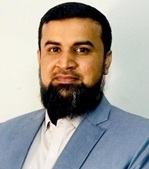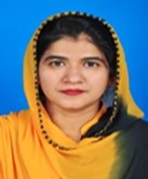Founding Chairperson:
Dr. Muhammad Shoaib Khan Pathan
Ph.D. in Economics, Post-Doc in Economics

Welcome to the Department of Economics at Government College University Hyderabad!
1. Introduction
The Department of Economics is a pivotal institution within GC University Hyderabad, upholding a legacy of academic rigor and making substantial contributions to the field of economics. Established during the academic year 1917-18 and formalized under the GC University Hyderabad Act of 2018, the department began its journey at the Main Campus and has since relocated to its new, expansive, yet underdeveloped, Kausar Campus. Founded and initially led by Dr. Muhammad Shoaib Khan, a distinguished Pakistani economist with a Ph.D. and Post-Doctorate in Economics, the department benefited greatly from his brief but impactful tenure, which laid a solid foundation for its current success and future growth.
2. Teaching Philosophy and Curriculum
Our teaching philosophy integrates theoretical rigor with practical application, equipping students with a robust understanding of economic principles and their implications in real-world contexts. The curriculum is diverse, encompassing traditional lectures, case studies, presentations, analytical reports, and field visits, ensuring students gain both conceptual knowledge and practical skills essential for modern economics.
3. Industry Integration and Continuous Assessment
We place a high priority on bridging academia with industry by frequently hosting guest speakers from leading economic and financial institutions, giving students exposure to real-world applications and industry practices. This professional interaction is complemented by a continuous assessment model, involving quizzes, terminal exams, presentations, and comprehensive reports, ensuring students grasp and retain their academic learnings effectively.
4. Alumni Success and Professional Preparation
Graduates from our department are well-prepared to succeed across diverse professional fields. Our alumni have made strides in sectors including banking, civil services (CSS), academia, research, and business, both domestically and globally. The training and knowledge acquired here empower them to excel in their careers and contribute meaningfully to their respective industries.
5. Research Initiatives and Projects
The Department of Economics actively pursues research initiatives addressing contemporary economic challenges. Faculty and students collaborate on diverse projects, producing insights that shape policy and practice, and further establishing the department’s role as a thought leader in economics.
6. Academic Community Engagement
Our department is committed to fostering a vibrant academic community through seminars, workshops, and conferences. These events offer platforms for intellectual exchange, enabling students, faculty, and visiting scholars to discuss cutting-edge research and explore innovative ideas in economics. This interactive environment promotes critical thinking and analytical skills, enriching the educational experience.
7. Commitment to Excellence
The Department of Economics remains dedicated to upholding its tradition of excellence through quality education, innovative research, and meaningful community engagement. We are committed to nurturing the next generation of economists, equipping them to lead and influence within an ever-evolving global economy.
Degree Offered:
- BS Economics
The Department of Economics prides itself on a distinguished faculty whose diverse expertise and advanced qualifications enrich its academic environment. Each faculty member holds degrees from highly respected institutions, bringing with them a strong foundation in both teaching and research. Their commitment to academic inquiry is evident in their numerous publications in leading national and international journals, as well as their active participation in high-level conferences. Additionally, they contribute to the body of economic knowledge through books, monographs, and other scholarly works.
Our faculty's expertise spans a broad range of economic disciplines, including quantitative development analysis, international economics, microeconomics, macroeconomics, financial market analysis, environmental economics, and Islamic economics. This diverse specialization ensures that students at both undergraduate and postgraduate levels receive a well-rounded education that emphasizes both theoretical rigor and applied research skills.
In addition to their teaching and research roles, our faculty members actively participate in the department’s academic culture. They regularly lead workshops, seminars, and guest lectures, contributing valuable insights and fostering meaningful dialogue. These engagements deepen our student's academic experience and reinforce the department’s reputation as a hub for serious economic scholarship and discourse.

Dr. Muhammad Shoaib Khan Pathan
Postdoctoral Research, (Poland); Ph.D. (Pakistan)
Chairperson

Dr. Bilal Ahmed Khan
Ph.D. Management Science, Engineering, and Economics (China)
Assistant Professor (IPFP-Fellow HEC)

Dr. Qurat-ul-Ain Memon
Ph.D Development Economics, College of Economics and Management, Anhui Agricultural University, (China)
Lecturer

Mr. Saifullah Babar
Master of Science in Financial Engineering (in progress) in WorldQuant University, United States America
Bachelor of Science in Mathematics and Economics (Pakistan)
[email protected]
[email protected]
+92-318-3046443
Faculty Member
The department offers a variety of programs designed to cater to the diverse interests and career aspirations of students. These programs are structured to provide a strong foundation in economic and finance theory, along with real-world applications.
Undergraduate Programs
- BS Economics: This program offers a comprehensive understanding of economic principles, quantitative methods, and their applications in real-world scenarios.
Eligibility for Admission
| Department | Class | Seats | Eligibility Criteria |
|---|---|---|---|
| Economics | BS | 40 | 'A' level/Intermediate (with Economics) / Intermediate Commerce, Intermediate Science |
Main Features:
- The program will be of eight (8) semesters duration with 130 credit hours.
- There will be two entry points. First, students will be admitted after F.A/F.Sc. in semester I. Second, in semester-V the students with a B.A/B.Sc. will be enrolled in deficiency courses. Special courses will be offered for these students to make up for their deficiencies.
1st Year
Semester-I
| Course No. | Subject | Credit Hours |
|---|---|---|
| 300.1 | English-I | 3 |
| 311.1 | Fundamentals of Economics | 3 |
| 300.2 | Islamic Studies | 3 |
| 311.2 | Mathematics for Economics-I | 3 |
| 301 | Optional (Non-economics) | 3 |
| Credit Hours | 15 | |
Semester-II
| Course No. | Subject | Credit Hours |
|---|---|---|
| 300.1.2 | Urdu | 3 |
| 300.2.2 | Pakistan Studies | 3 |
| 312.1 | Principles of Microeconomics | 3 |
| 312.2 | Mathematics for Economics-II | 3 |
| 302 | Optional (Non-economics) | 3 |
| Credit Hours | 15 | |
2nd Year
Semester-III
| Course No. | Subject | Credit Hours |
|---|---|---|
| 400.1 | English-II | 3 |
| 411.1 | Principles of Macroeconomics | 3 |
| 400.2 | Introduction to Computer System | 3 |
| 411.2 | Statistics for Economics-I | 3 |
| 401 | Optional (Non-economics) | 3 |
| Credit Hours | 15 | |
Semester-IV
| Course No. | Subject | Credit Hours |
|---|---|---|
| 400.2 | English-III | 3 |
| 412.1 | Economics of Pakistan | 3 |
| 412.2 | Statistics for Economics-II | 3 |
| 402.1 | Optional (Non-economics) | 3 |
| 402.2 | Optional (Non-economics) | 3 |
| Credit Hours | 15 | |
3rd Year
Semester-V
| Course No. | Subject | Credit Hours |
|---|---|---|
| 511 | Intermediate Microeconomics | 3 |
| 521 | Development Economics | 3 |
| 531 | Mathematical Economics | 3 |
| 541 | Public Finance | 3 |
| 501.1 | Environmental Science | 3 |
| 501.2 | Optional (non-econ.) | 3 |
| Credit Hours | 18 | |
Semester-VI
| Course No. | Subject | Credit Hours |
|---|---|---|
| 512 | Basic Econometrics-I | 3 |
| 522 | Intermediate Macroeconomics | 3 |
| 532 | Monetary Economics | 3 |
| 502.1 | Communication Skills | 3 |
| 542 | Optional (economics) | 3 |
| 502.1 | Optional (non-Econ) | 3 |
| Credit Hours | 18 | |
4th Year
Semester-VII
| Course No. | Subject | Credit Hours |
|---|---|---|
| 611 | International Trade Theory | 3 |
| 621 | Research Methodology | 3 |
| 631 | Basic Econometrics II | 3 |
| 641 | Islamic Economics | 3 |
| 651 | Optional (Economics) | 3 |
| Credit Hours | 15 | |
Semester-VIII
| Course No. | Subject | Credit Hours |
|---|---|---|
| 612 | Research Project or Internship Report or Seminar in Applied Econ. Or Research Paper. | 6 |
| 600 | Optional )non-econ.) | 3 |
| 622 | Financial Institutions & Markets(Optional) | 3 |
| 632 | Optional (Economics) | 3 |
| 642 | Optional (Economics) | 3 |
| Credit Hours | 18 | |
- All the above courses are compulsory unless mentioned therein
Four Years BS Hons. Year Program
Total Credit Hours for BS Economics = 129
Department Environment
The Department of Economics at Government College University Hyderabad is designed to create a rigorous academic and research-focused atmosphere. With spacious lecture halls, well-equipped classrooms, a state-of-the-art computer lab, a dedicated research lab, and a specialized seminar library, the department provides ample resources for students and faculty. Office spaces for faculty and administrative staff further contribute to an organized and accessible learning environment.
Seminar Library
The seminar library in the Department of Economics is integral to supporting intensive study and research. It offers a range of academic resources and literature essential for economics courses, ensuring that students have access to foundational and advanced materials throughout their academic journey. For resources beyond the library's collection, students and faculty can use inter-library loan services, granting access to the main library and specialized research resources at GC University Hyderabad.
Computer Lab
The computer lab is a critical asset for students pursuing economic studies, equipped with 30 computers dedicated to economic modeling, financial simulations, and statistical analysis. This lab enhances students’ proficiency in technical tools essential for economic research, data interpretation, and policy analysis. Through hands-on experience with modeling software and data applications, students sharpen their analytical and problem-solving skills, preparing them to excel in today’s data-driven economic landscape.
Research Lab
The newly established Research and Development Lab is a specialized facility for BS, M.Phil., and Ph.D. students, equipped with 20 advanced computers. This lab enhances the department's research capabilities, supporting both quantitative and qualitative research and fostering an environment of rigorous academic inquiry. By offering resources for high-level data analysis and interdisciplinary collaboration, the R&D Lab is pivotal in encouraging innovative research and advancing the department’s standing in economic studies.
Extracurricular Activities
Recognizing the importance of holistic development, the department encourages participation in sports such as cricket, football, and hockey, with inter-departmental tournaments organized annually. Academic enrichment is further supported by study tours and institutional visits to financial organizations, bridging theoretical concepts with real-world exposure. The department fosters an inclusive community where students maintain close, open communication with faculty, supporting their growth into confident, mature, and dynamic professionals.
Awards
The department acknowledges academic achievements through awards funded by philanthropists, including Gold Medals for students who secure top positions. These awards underscore the department's commitment to academic excellence and reward students’ dedication and hard work.
Achievements
The Department of Economics is renowned for its high academic standards, demonstrated by initiatives such as the Research and Development Lab, an AI Lab, and a Smart Classroom Lab. The department aspires to establish the first-ever Social Sciences Lab at GCUH, equipped with pioneering research in "Supereconomics," green energy, and blue energy. This vision underscores GCUH’s dedication to becoming a leading institute for social and economic research, positioning itself at the forefront of impactful research and education in Pakistan.
For Further Enquiry
DEPARTMENT OF ECONOMICS
GC UNIVERSITY HYDERABAD, SINDH, PAKISTAN - 71000
Telephone: +92-022 (2664198)
Email: [email protected]